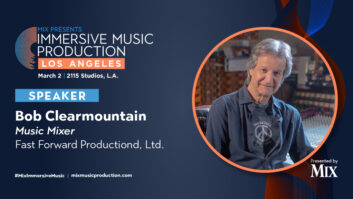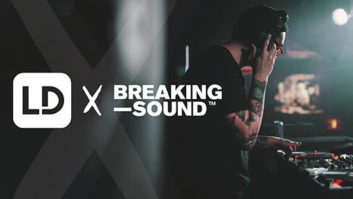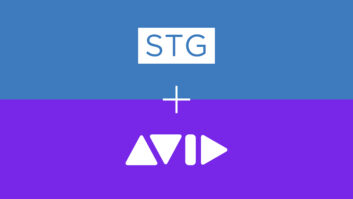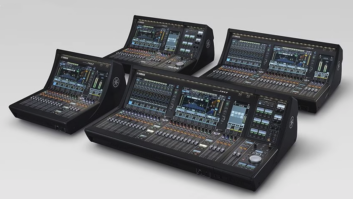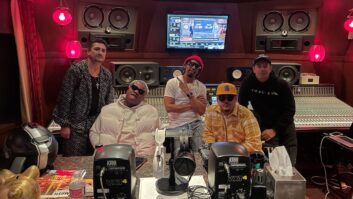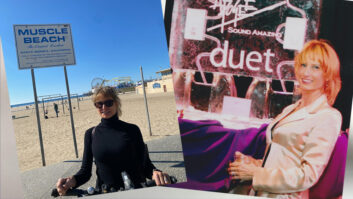
You don’t need us to tell you that this is a challenging time to be entering the audio business. Commercial recording studios have been vanishing at an alarming rate for several years, triggered by the rise of home studios and a decline in the fortunes of the record business. The live touring industry has been rocked by increased expenses for nearly everything, from gas to hotels to equipment, often cutting into the pay of sound personnel. And at the same time, there has been a boom in recording schools and audio programs in colleges and universities, so there are more talented, qualified people looking for work in the industry than ever before.
To get a better sense of the job landscape that awaits aspiring audio types, we talked recently with several studio operators and job-placement coordinators at audio schools: Kirk Imamura is president of Avatar Studios in New York City; Rose Mann-Cherney is president of Record Plant Studios in Los Angeles; Becky Sullivan is operations manager of of the Hollywood post facility Soundelux, and is a successful supervising sound editor; Chris Haseleu is chairman of the Recording Industry program at Middle Tennessee State University (MTSU) in Murfreesboro, Tenn.; and Jayson Khademi is the director of student services at the Conservatory of Recording Arts and Sciences (CRAS) in Tempe, Ariz.
Paying Dues
The first illusion to be shattered is that a fresh-faced kid graduating from a recording school/program — much less coming off the streets without any training — can waltz into a studio, land a good-paying job as an engineer and in short order be setting up mics for Bono and The Edge. Much more likely is the prospect of working as an intern for free for a while and then getting a low-wage position as a runner (“go-fer” has such an unappealing ring to it), which might include helping with documentation of Pro Tools sessions in between getting coffee and bagels for the engineers. This naturally raises the question: “I paid x-thousand bucks for an audio education to do that?”
Yup. ‘Twas ever thus. Sure, we’ve all heard stories about the assistant to the assistant engineer who suddenly finds himself sitting at the console one day because everyone else in the studio is gone or sick and, say, David Bowie really wants to track that day. So the kid gets his shot, somehow sweats his way through the session (because he’d learned so much from osmosis just being in the studio), Bowie likes him and in no time the kid has graduated to a full-fledged engineer. Well, dare to dream, but it rarely happens that way.
“So many kids today know a lot about recording even before they come to a school,” says MTSU’s Haseleu. “They’ve all done recording at home, whether it’s GarageBand or Cakewalk or something, and many of them are even at the Pro Tools LE level. There’s good news and bad news with that. They come in conversant with the technology, but a lot of them have learned some really bad habits as well because they’re usually recording in bad environments.
“But even with this base of knowledge and then with what they learn here, I think they understand it’s going to be a tough road out there,” Haseleu continues. “They don’t come in with high expectations about the job market. It’s still one of those things where you have to have the passion to make it in the business. Nothing gets handed to you.”
“Our production assistant interns know that they’re basically getting a runner position,” notes Avatar’s Imamura, who has taken on many former audio students for three-month internships and had some move on to real positions at the studio. “But it’s still important work for the studio, and you’re in the studio, seeing what goes on and helping out however you can. We’ve found that the people who can’t tolerate that fall by the wayside. You do get some people who think they’re going to walk in and be producing in a few months — that type usually doesn’t survive. There’s nothing wrong with feeling that way about yourself — maybe you will be a great producer — but that’s not what it’s going to be about at the entry level.” Imamura says it typically takes two or three years to work up to the assistant engineer level.
Know the Basics and More!
CRAS’ Khademi says, “Regardless of what that entry-level position might seem like, a lot of the time it’s still the way you break in usually, and the people who get those jobs are still expected to know about recording. They still need to know the basics — signal flow and miking and all that — but these days, too, they’re expected to know so much more because of computers. Understanding digital patching is important — making sure this program talks to that program. We’ve had people come here who had literally never sent an e-mail before, but when they leave they’re Pro Tools whizzes.
“There’s a lot to learn,” he continues, “but first and foremost what studios ask us about when we’re talking about students is attitude. The skills are almost secondary because they need somebody who can be cool and fit into the studio. They want cool people who can sit in the back and not get in the way. But they also have to be smart when the time comes for them to shine.”
Although Haseleu agrees that traditional theory, recording techniques and knowledge still form the basis of a quality audio education, he says, “No one gives a stitch about analog magnetic recording anymore unless you want to work for a restoration lab or something. These days, the more different DAW platforms you know the better off you are because so much of the work is going to be platform-specific, and they’re going to ask you, ‘Do you know Nuendo? Do you know Pro Tools? Do you know Logic?’ And you have to be able to say you have some experience on it.”
Still, it’s not an entirely digital world, particularly at the upper levels. Rose Mann-Cherney from Record Plant notes that “old-school” knowledge “is important, as all our clients still use analog boards and outboard gear. Knowledge of signal flow is just as important as it was 30 years ago. Analog tape machines are not used as often, but are still requested from time to time. Having the knowledge of ‘old-school’ recording and knowing the limitations that engineers were faced with can only enhance modern techniques.”
And Avatar’s Imamura says, “Our studio is more analog, so we need people who understand what that’s all about. We don’t want people who are just going to sit in front of a screen. Believe it or not, we still use tape!” That said, he adds that today’s production assistant, rather than labeling and organizing tape boxes, spends more time keeping track of hard drives and what’s on each of them. “There’s actually more documentation than ever before,” he says. “It’s really an important part of the digital world.” And that’s one reason Imamura looks for people “who seem to be really conscientious and detail-oriented because the job, whether you’re a production assistant or an engineer, is very detail-oriented. Every job in a recording studio involves tremendous focus. We also look for people with good common sense, which can be in short supply,” he chuckles. “So it’s not just about knowledge or ability. It’s temperment and desire. They really have to want to do this.”
What intangibles is Mann-Cherney looking for? “Self-motivation, passion, patience, sense of humor and knowing how to be invisible.
“The business is changing,” she adds, “and engineers need to be more versatile and wear different hats. Because of this, the job of assistant has totally changed. Assistants need a strong knowledge of not only engineering, but music theory, the music industry and technology in general.”
Reality Check
No doubt, many students envision themselves working their way up the ladder at places like Record Plant or Avatar, or some other glamorous major studio, but the odds of that happening are, frankly, not in their favor. So what is a more realistic path to jumping into the audio world? Well, you need to expand your horizons and be flexible.
Imamura notes that “some small studios provide a really good training ground. We’ve had people come from working at owner-operated studios who are really well-trained and they get up to speed here really fast. If you know where to look, you can sometimes find situations like that, and it becomes a good way to get your foot in the door.”
Another way to get some experience is to look beyond traditional recording studios. Now, some people really do want to be the next Steve Albini or Jimmy Iovine and can’t see beyond that big studio control room to envision themselves in some other audio-related position. But increasingly, the jobs are elsewhere.
According to CRAS’ Khademi, “A lot of people come here thinking they want to work in a studio, but then they get exposed to other things, and suddenly they say, ‘Hey, I really want to get into live sound!’ I’ve seen more kids getting hired into live sound sooner than kids going into studios because the turnover rate in live sound is higher. There are so many more entry-level jobs there. They’re young and they’re not afraid to bust their butts, which you’re definitely going to do in live sound! But we encourage it, because even though it’s not a studio, it might be right for you, or you could view it as a way to meet people in the industry and get paid a little bit while you’re working toward a studio gig.
“There are lots of other places to look for jobs in audio,” Khademi continues. “We’ve placed people with the Library of Congress and in forensic audio. We’ve gotten people into game audio, though most [job] applications there require one to two years of experience, so we encourage people to also get into post-production, which is fairly closely related. We have courses here where students can learn some post basics, learn about commercial production, Foley, dialog replacement. Those are all possible job areas for some people.”
Becky Sullivan of giant post house Soundelux says that they very rarely hire people directly out of school: “Most of the editors here have been here for 10 years-plus, so we don’t bring in a lot of ‘green’ people. In sound editing, it’s really important that they get out there and learn their craft. Sound editing is not just being able to run a Pro Tools computer. It’s a real craft and that takes experience to learn how to do it well — how to layer the sounds and have it work for the emotion of the picture and work for the mixers and be good.
“A lot of times, I’ll tell young people who are trying to break into film sound, ‘Go to some of the smaller companies in Burbank or Santa Monica and tell them you’ll work for free and do whatever needs to be done to get in, and really learn your craft and earn your stripes.’” Unfortunately, because of union restrictions, Soundelux does not currently have an internship program. “The union doesn’t like free labor,” she says. “If an intern came in and cut a reel of dialog, I’d have to throw it in the trash because I cannot prosper from his free labor. But a lot of the smaller independent companies use interns.” So, she advises, don’t be afraid to do the legwork to find out who might need some help. You’ll get a lot of “no’s,” but one “yes” — even in a field that might seem tangential to what you really want — might lead to an exciting career path you never expected.
“Studio gigs are few and far between,” is Haseleu’s sober assessment, “but our folks seem to be finding jobs in emerging markets, so we’ve had a number of people go into broadcast audio because there’s so much more work in hi-def and broadcast engineers aren’t sure what 5.1 is, and so on. Then also, new media like Internet companies and game support. A couple of people have gone to places like [Electronic Arts] and applied to the production department and gotten assistant gigs.
“One thing I would say about the more traditional recording studio career, though, is that it’s maybe a little easier to make what I would call a ‘middle-class living’ for an artist, engineer or producer,” Haseleu adds. “You don’t have to be working in Hollywood with a major act to make a decent living. You could be working out of your house. Your product may end up on a band’s CD that they’re selling with their shows or distributing off Internet sites. Maybe the band is playing the college circuit, which is not too exciting for somebody who had visions of being the Rolling Stones or whatever, but string some of those kinds of jobs together and you can make a living doing it. It’s hard, no doubt about it, but it’s worth it if it allows you to do what you love to do.”
Blair Jackson is Mix magazine’s senior editor.
